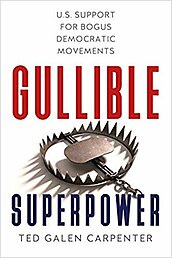Gullible Superpower is available in stores and online, wherever books are sold.
Unlike recent policymakers and opinion-shapers, the first few generations of American leaders made a sharp distinction between the legitimate interests of the republic and foreign causes that purported to seek the overthrow of tyrannical rule and establish democratic systems based on respect for fundamental rights. No one made that distinction more emphatically than Secretary of State John Quincy Adams. In a celebrated Fourth of July address, Adams implicitly rebuked growing calls for Washington to support republican independence movements in places ranging from Greece to Latin America. The United States, Adams noted, had abstained from interference in the concerns of other nations, even when a conflict “has been for principles to which she clings.” He stressed the imperative reasons for such a stance. “She well knows that by once enlisting under other banners than her own, were they even the banners of foreign independence, she would involve herself beyond the power of extrication, in all the wars of interest and intrigue, of individual avarice, envy, and ambition, which assume the colors and usurp the standard of freedom.”
That is precisely what has occurred in recent decades. Over the last forty years, there is a distressing history of foreign insurgent groups being able to manipulate U.S. policymakers and opinion leaders into supporting their cause. Frequently, that support goes far beyond rhetorical endorsements to include financial and even military assistance to highly questionable individuals, organizations, and movements. Sometimes those efforts have even entangled the U.S. military in bloody, unnecessary, and morally dubious wars, as in Kosovo, Iraq, Libya, and Syria. These crusades have caused a stain on America’s honor and frequently produced tragedies in the countries where Washington interfered. Gullible Superpower examines the most prominent cases in which well-meaning Americans have supported such misguided policies. This book underscores the need for future U.S. leaders to adopt a policy of skepticism and restraint toward foreign movements that purport to embrace democracy.
